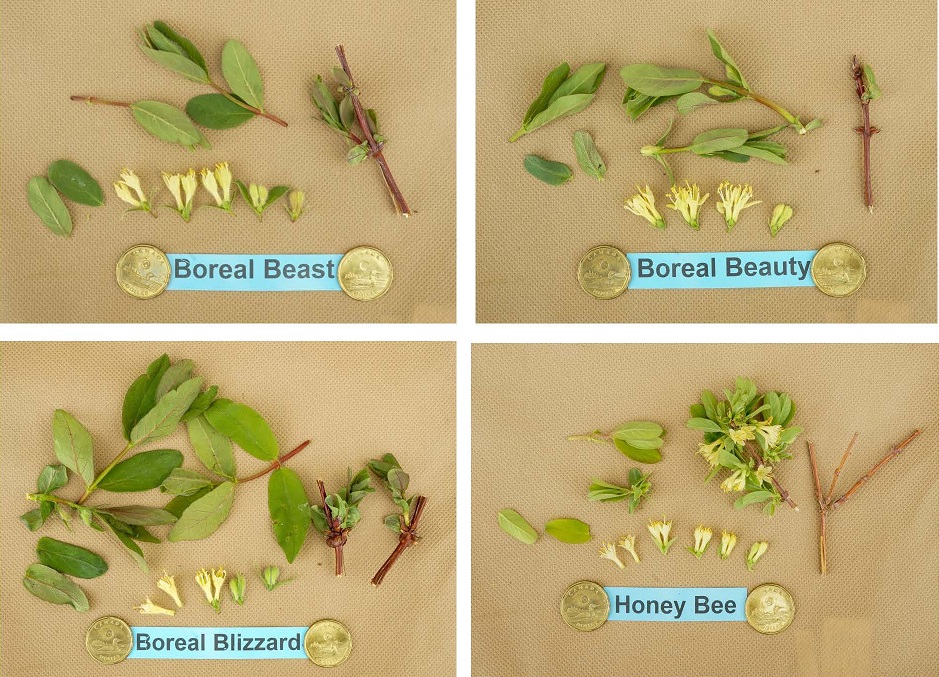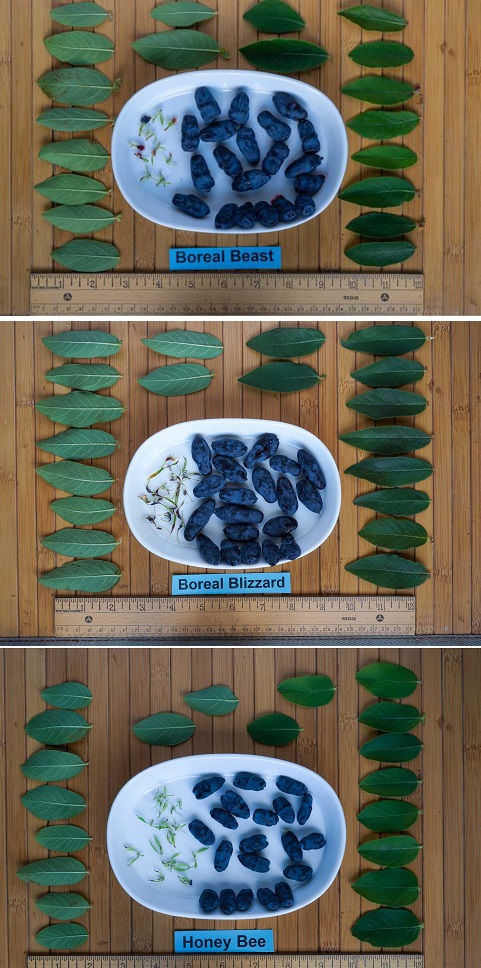Boreal Beast
| Denomination: | 'Boreal Beast' |
|---|---|
| Botanical Name: | Lonicera caerulea |
| Applicant/Holder: |
University of Saskatchewan Crop Development Centre 4D36 Agriculture Building, 51 Campus Drive Saskatoon, Saskatchewan S7N 5A8 Canada |
| Breeder: |
Robert H. Bors, University of Saskatchewan, Saskatoon, Saskatchewan |
| Application Date: | 2016-02-22 |
| Provisional Protection:: | 2016-02-22 |
| Application Number: | 16-8827 |
| Grant of Rights Date: | 2024-02-07 |
| Certificate Number: | 6989 |
| Grant of Rights Termination Date: | 2044-02-07 |
Variety Description
Varieties used for comparison: 'Boreal Blizzard' and 'Honey Bee'
Summary: The one-year-old shoot of 'Boreal Beast' has no lenticels while that of 'Boreal Blizzard' has lenticels present. The bark of the one-year-old shoot of 'Boreal Beast' is dark brown whereas that of 'Boreal Blizzard' is red brown and that of 'Honey Bee' is yellow brown. The shoot tip of 'Boreal Beast' has absent or sparse pubescence whereas that of 'Honey Bee' has medium density pubescence near the expanding leaves. The buds of 'Boreal Beast' burst mid to late in the season while those of 'Honey Bee' burst early to mid-season. The leaf blade of 'Boreal Beast' is shorter than that of 'Boreal Blizzard' and longer than that of 'Honey Bee'. The shape of the leaf blade apex of 'Boreal Beast' is acute while it is rounded for 'Honey Bee'. The fruit begins to ripen mid to late season for 'Boreal Beast' and early to mid-season for 'Honey Bee'. The fruit of 'Boreal Beast' is shorter than that of 'Boreal Blizzard' and longer than that of 'Honey Bee'. In lateral view, the fruit of 'Boreal Beast' is obovate while that of 'Honey Bee' is narrow oblong. The fruit of 'Boreal Beast' has a small eye opening while the fruit of 'Boreal Blizzard' has a medium sized eye opening. The calyx end of the fruit of 'Boreal Beast' is rounded while it is truncate for 'Boreal Blizzard'. The fruit weight of 'Boreal Beast' is less than the fruit weight of 'Boreal Blizzard' while it is greater than that of 'Honey Bee'.
Description:
PLANT: medium to strong vigour, semi-upright growth habit, medium to strong branching, mid to late season bud burst
ONE-YEAR OLD SHOOT: no lenticels, absent or very sparse pubescence, dark brown bark, medium strength development of adventitious buds
SHOOT TIP: absent or sparse pubescence, absent or weak glossiness of bark, medium intensity of anthocyanin colouration
LEAF: moderately elongated, acute apex, absent or very sparse pubescence on lower side, medium green on upper side
STEM-CLASPING LEAF: medium sized, pubescent
FLOWER: flowering begins mid-season, medium to dense pubescence on corolla tube, horizontal attitude, style longer than anther
SEPAL: short
FRUIT: ripening begins mid to late season, narrow elliptic in cross-section, obovate in lateral view, rounded shape of calyx end, tip predominantly present and sometimes absent, sometimes had small tips of skin projecting from the flower ends of fruit, but sometimes this was not present, small eye opening, intermediate between smooth and rough surface, no tufts of hairs at apex except tiny hairs on some fruits
FRUIT SKIN: medium degree of bloom, dark intensity of blue colour
Origin & Breeding History: 'Boreal Beast' (experimental code 14-16-9.25) originated from a controlled cross made in 2010 at the University of Saskatchewan Plant Sciences Greenhouse, Saskatoon, Saskatchewan. The cross was made between the variety 'Best 2' and 'MT46.55' from the Maxine Thompson breeding program. 'Boreal Beauty' was selected in 2014 for its blooming time; fruit productivity, size and flavour; and its bush attributes for mechanical harvesting.
Tests & Trials: The comparative trials for 'Boreal Beast' were planted in 2016 and conducted during the 2020 and 2021 growing seasons at the University of Saskatchewan Horticulture Plots in Saskatoon, Saskatchewan. The trial initially consisted of 7 plants per variety, but there was some loss due to deer and rabbits. The plants were grown in 30 metre rows with 1 metre spacing between plants. The distance between rows within the trial was 3.5 metres. Guard rows were taller and 6 years older than the variety trial. Observations and measurements were taken from 7 plants, or parts of 7 plants, of each variety. Mean differences were significant at the 5% probability level based on a paired Student's t-test.
Comparison tables for 'Boreal Beast' with reference varieties 'Boreal Blizzard' and 'Honey Bee'
Leaf length (cm)
| 'Boreal Beast' | 'Boreal Blizzard' | 'Honey Bee' | |
|---|---|---|---|
| mean | 5.7 | 6.7 | 4.7 |
| std. deviation | 0.60 | 0.54 | 0.41 |
Fruit length (cm)
| 'Boreal Beast' | 'Boreal Blizzard' | 'Honey Bee' | |
|---|---|---|---|
| mean | 2.9 | 3.4 | 2.4 |
| std. deviation | 0.19 | 0.39 | 0.16 |
Fruit weight (grams)
| 'Boreal Beast' | 'Boreal Blizzard' | 'Honey Bee' | |
|---|---|---|---|
| mean | 2.34 | 3.05 | 1.60 |
| std. deviation | 0.22 | 0.45 | 0.21 |
Click on image for larger view

Blue Honeysuckle: 'Boreal Beast' (top left) with reference varieties 'Boreal Blizzard' (bottom left) and 'Honey Bee' (bottom right)
Click on image for larger view

Blue Honeysuckle: 'Boreal Beast' (top) with reference varieties 'Boreal Blizzard' (centre) and 'Honey Bee' (bottom)
- Date modified: